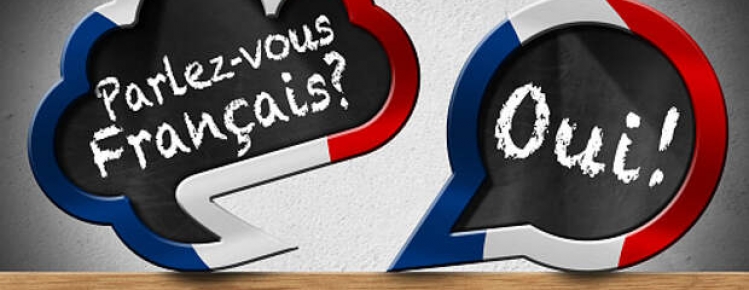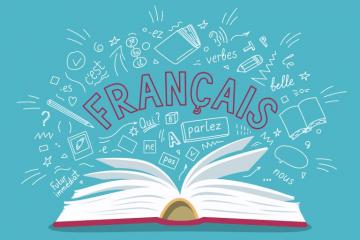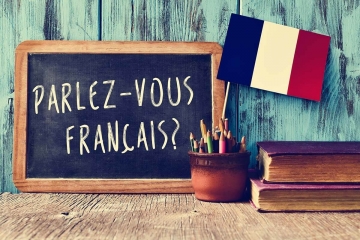
All the hours spent poring over textbooks and copybooks, practising listening skills and writing essays are supposed to bring us to our final and most important goal - speaking the language in real life.
Without live communication all our hard work is just in vain!
Finally, this anticipated moment has come. Maybe it’s a trip abroud, business trip or a speaking club meeting…Quelle chance! But even having enough knowledge can’t save us from the fact that there are quite a few unexpected differences between what we learn in the textbooks (even the latest ones) and real life spoken language.
We are going to show you some moments to pay attention to, how to confidently get to a new stage and how to level up your communication with francophones!
Fast speaking
- Fast speaking pace and, as result, omission of vowels, contractions, abbreviations.
The French are really talkative, they will easily start a conversation, and enjoy spending a lot of time chatting. Communication is just as important as their food culture which is confirmed by cozy streets Of Paris densely packed with tables, at which people do not stop conversations on multiple topics in any weather.
So the first difference is fast speaking pace which results in omission of vowel sounds. Let’s have a look at a famous song by Zaz
"Je veux ", where we can hear a typical omission of the vowel e: "Je veux d'l'amour, d'la joie ....Moi j'veux crever la main le cœur… ".
You might also here in a conversation:
ch’sais pas [shep`А] instead of je ne sais pas
c’que [sk`YO] instead of ce que
One gets used to this feature prettz quiclz, as well as to the fact that speech is full of contractions.
Here are some of them:
colocataire (flatmate/housemate) → coloc
préparation (preparation) → prépa
ordinateur (computer) → ordi
mathématiques (mathematics) → math
disponible (available) → dispo
restaurant (restaurant) → resto
bon après-midi (have a god day) → bon aprèm
à tout à l'heure (see you soon) → à tout
à plus tard (see you later) → à plus
d’accord (I agree) → d’acc
comme d’habitude (as usual) → comme d’hab
petit-déjeuner (as usual) → p`tit-déj
apéritif (apperetive) → apéro
McDonald's → Macdo
dictionnaire (dictionary) → dico
Along with contractions abbreviations are also quite common. They can be formed both from proper name, for example, Jean-Pierre→JP, and from phrases: так и из выражений : enterremen de vie de jeune fille (bachelorette party, literally - the funeral of young lady’s life) → EVJF.
Lexical composition of the spoken language
- Lexical composition of the spoken language is really multi-layered where each layer indicates belonging to a certain subculture, region or social status.
Obviously, it is impossible to fully cover this mater within one article.We will simply recommend that you use langue familière with caution, since its place is in the informal register of communication.
Here is the list of the most common slang words with a neutral meaning which you can often come across in colloquial speech and contemporary songs:
un mec a guy, a bloke une meuf, une nana a girl, a chic un pote a mate une bagnole a car, a ride une bécane a motorbike Le fric, le pognon, la thune, l’oseille money bouffer to eat, scram, chow la bouffe food se bourrer, se saouler to get wasted des fringues clothes se barrer, se casser leave, slope off oh la vache bummer! un boulot work bosser to work, slog une clope a fag draguer to flirt, to hit on someone s'éclater hang out emmerder to piss someoneoff, to annoy un truc, un machin, un bidule just a thing, some stuff une baraque a shack, a hut le bahut a school la gratte a guitar la teuf a party j`ai la flemme I can’t be bothered
And a few words about a good old verlan, if you aren’t familiar with it yet. Verlan is the word l’envers (vice versa), in which syllables are reversed. This way allows you not to be understood by ‘strangers’ and it’s very popular with the youth. A great example is Stromae, a French singer’s pseudonim. It is formed from the word Maestro by rearachibg syllables.
Here are a few more examples:
Mec → Keum
Femme → Meuf
Fou → Ouf
Fête → Teuf
I’d like to say a couple of words about so-called tics de langage -
filler-worrds. There is no need to be afraid of them. Their function is to fill in some pauses and make your speech more authentic but there is certainly no need to overuse them.
Speaking with native speakers you quite often might hear:
ouai [ue] instead of oui
ben [be῀] instead of bien
hein [e῀] as n’est-ce pas?
quoi [kua] at the end of the sentence to emphasise the meaning
For example:
Ben ouai, quoi ! Yeah, sure!
Gestures and mimics
- Gestures and mimics.
It’s an integral aspect of communication with the French. Body language is one of the ways to express artistic French soul!
Gesture "Mon œil ! Je ne te crois pas!" which means: "I don’t believe you!"
"Il a un verre dans le nez." This one means that the person we are speaking about is really drunk.
“J`en sais rien!” – «No idea!»
More information on this topic you can find here.
It’s fantastic that these days there are a lot of textbooks based on communicative approach which help to role play real life situations. And we really hope that real live communication will be this ‘cherry on top of the cake’ as a result of your hard work.
We wish you successful communication and self-confidence!






























